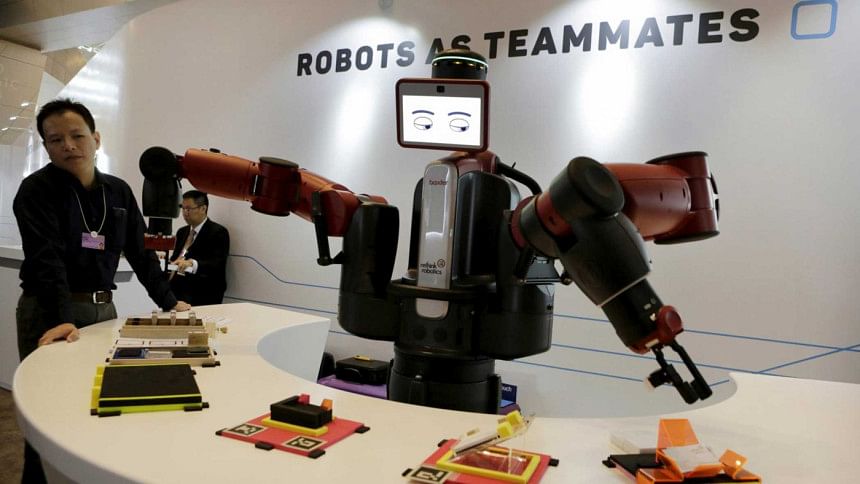Race with the machine

The other day, a technician came over to fix my internet connection. He was a computer science graduate. But this is a job that any vocationally-trained person could do well—it doesn't require a four-year university degree. Then, a piece of news caught my attention: Robots are preparing and delivering food at the 2022 Beijing Winter Olympics, requiring far fewer human employees than before. What do these two scenarios indicate about the future of jobs?
Speakers in career forums often offer definitive guidelines to jobseekers. They suggest that jobseekers learn the latest programming tools, get a degree in data science, enrol in a business programme, and so on. But many university graduates with such skills end up going for jobs that don't even use their qualifications. And soon, many jobs won't require humans at all if the Beijing Olympics is anything to go by.
The scenario in developed countries reflects this. Approximately 41 percent of recent American college graduates can't find jobs that match their qualifications and end up being underemployed. In Great Britain, 45 percent of recent university graduates are working in jobs that do not require their degrees. The supply of tertiary graduates is increasing in most European countries, but the growth of graduate jobs is slower. If today's graduate skills are already unsuitable for market needs, what might be the case for future graduates?
The ongoing Fourth Industrial Revolution (4IR) and the associated rapid automation processes will upend the way we view jobs. During the previous industrial revolutions, agricultural workers could move to cities and find jobs in the factories. Gradually, industrial workers moved to service sectors. Currently, in the US, only one percent of the working population is in the farming sector, 20 percent in manufacturing, and a whopping 79 percent in the service and knowledge sectors, as World Bank data shows. Those in the service and knowledge sectors are designing websites, interpreting medical images, diagnosing diseases, writing newspaper articles, or searching through various legal files. They use their skills, experience, and knowledge to carry out a particular task. These are what we call white-collar workers who have so far been enjoying secure and stable incomes. Now, the 4IR is here to disrupt all that.
These days, automation software can write newspaper articles and weather reports. Law clerks don't have to search for legal information as a software will do it much faster and more efficiently. Doctors won't need to train their eyes on computer images looking for abnormalities, as a mere piece of software will pick them up in an instant. Even computer programming is getting automated as several no-code development platforms (NCDPs) are already available in the market. College graduates will have to compete against such machines in an ever-shrinking job market.
"Humans Need Not Apply" is the title of a book that Stanford University academic Jerry Kaplan wrote in 2015. Kaplan has warned that automation is blind to the "colour of your collar". Automation can gobble up every job regardless of its level of sophistication. But some jobs are more at risk of automation than others.
Futurist and author Martin Ford, in his bestseller "Rise of the Robots," tackles the question of which jobs are the safest in the face of the tech onslaught. His answer is: "Any job that is not routine or predictable." The jobs that offer new challenges every day and ones that require constant learning or innovation to be carried out will remain in demand. For such a job, technology will assist the process, but is unlikely to replace it. If the job is to produce the same reports, data, or presentation every time, it is likely that an automation process will soon devour it. So, the jobs that will still be around will involve collaborating with machines. According to MIT professors Erik Brynjolfsson and Andrew McAfee, workers should learn to "race with the machines," rather than against them. But today's machines run on technology that is a different beast altogether.
On April 23, 2013, the official Twitter account of the Associated Press (AP) tweeted, "Breaking: Two Explosions in the White House and Barack Obama is injured." A group of pro-regime hackers from Syria had faked the system. Only a minute later, Dow Jones nose-dived. AP fixed the problem three minutes after the initial attack. Within those precious three minutes, the equity market lost USD 136 billion in value. And in the next three minutes, the market recovered. All this happened with no human intervention, except the hacking.
The previous industrial revolutions gave workers time to learn new skills and find new jobs. The 4IR may not allow us the same. Today's job seekers must learn to live with automation in every sector and find their places within it—racing with, and not against, the machine.
Dr Sayeed Ahmed is a consulting engineer and the CEO of Bayside Analytix, a technology-focused strategy and management consulting organisation.

 For all latest news, follow The Daily Star's Google News channel.
For all latest news, follow The Daily Star's Google News channel. 



Comments